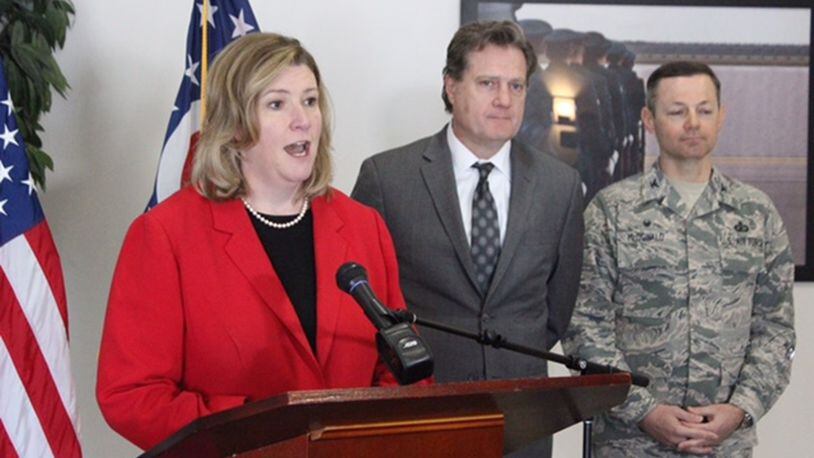“There’s a number of things on the congressional level I think we might be able to do,” Turner, a member of the House Armed Services Committee, said at a press conference at Wright-Patterson with other area leaders Monday.
Dayton Mayer Nan Whaley, who also spoke at the press conference, said as the community compiles a “to-do” list of priorities, it could ask the federal government to pay for the work.
City leaders have asked neighboring communities to urge the Air Force and Wright-Patterson to act quickly to prevent contamination of the Huffman Dam well field along the Mad River.
RELATED: Foam that tainted wells in Colorado feared in Dayton
Seven drinking water production wells were turned off last year at the well field as a precaution, officials have said. Monitoring wells detected polyfluroalkyl substances (PFAS) on site, but officials said it was below a U.S. EPA threshold of 70 parts per trillion for lifetime exposure to drinking water.
Federal, state and local leaders say the water is safe to drink and the contaminant has not been found in treated water piped to consumers.
Wright-Patterson installation commander Col. Bradley McDonald, Montgomery County Commissioner Deborah Lieberman, and Dayton Development Coalition vice president Maurice McDonald joined Turner and Whaley at the press conference at the Hope Hotel and Conference Center.
“I think it’s clear that we’re all on the same page,” Whaley said. “I think that that’s a very big deal.”
RELATED: Dayton urges communities to push Wright-Patt for action on water
“The key here is that we all want to make sure that our water is safe and it is safe,” Lieberman said. “The point of this is just to make sure that continues.”
The city has dealt with its own contamination concerns at a firefighting training center at 200 McFadden. In 2016, five drinking water wells were shut down at the Tait’s Hill well field as a precaution, officials said.
The city says monitoring wells at that Mad River location detected contamination of up to 1,260 parts per trillion of PFAS, which was found in an old formula of the firefighting foam.
Ohio EPA has ordered both Wright-Patterson and the city of Dayton to take action on groundwater contamination. None of the production wells that were shut down were tested for the contaminant, according to the city.
The Dayton Development Coalition and the Miami Valley Regional Planning Commission will work with federal, state and local leaders on groundwater issues, authorities said Monday.
RELATED: Wright-Patt treating tainted water in contaminated drinking wells
“What we’re trying to do here is be proactive and make sure it never (is) an issue,” Whaley said. “That’s important to the future of the city and the future of the region so we can grow jobs, so we can continue to have a safe place to live, work and play.”
The city had sought nearly $1 million from the Air Force to track and test where the tainted groundwater was headed off Wright-Patterson, but the military branch said it was prohibited under federal environmental law to reimburse expenses already paid.
Once the study is completed, the mayor said she’s hopeful money to pay for expenses will follow from the federal government.
“I think that’s very doable with who is at the table,” she said.
Col. Bradley McDonald said the Air Force has replaced firefighting foam believed to have caused contamination – the last of which will be removed in hangars this June — and installed more sentinel wells to track where a tainted plume is headed, officials say.
“What we are showing on the boundary of the base is that it is safe,” he said.
Wright-Patterson officials say they have reacted with urgency to concerns over tainted groundwater despite the city of Dayton’s demands asking for faster action to prevent the potential threat of groundwater contamination reaching the Huffman Dam well field.
RELATED: Is our drinking water safe? Chemical spills alarm protectors
But if upcoming expanded testing this summer determines a tainted groundwater plume is migrating off site, the Air Force will take additional actions, Wright-Patterson officials say
For the first time, the city detected less than 10 parts per trillion of the contaminant last November at its Ottawa water treatment plant.
Among the demands Dayton has issued to Wright-Patterson: Install additional monitoring wells along the base boundary; relocate a Mad River storm water discharge point by about 200 feet so it won’t flow past a city intake; and sharing water data so the city can plan how to respond.
Wright-Patterson has addressed tainted groundwater concerns for more than two years, from tracking possible pathways for tainted groundwater to migrate on and off base; temporarily shutting down two drinking water wells in 2016 that exceeded EPA advisory thresholds; and building a $2.7 million water treatment facility to resume pumping from those closed wells last June.
The Air Force investigation and mitigation efforts “are in full compliance” with state and federal laws, the base said in a statement.
RELATED: Top 10 water users in Dayton
PFAS contamination, at certain levels, can cause major health concerns. According to the U.S. EPA, human epidemiology and animal testing studies indicate high-level exposure to the contaminant may lead to testicular and liver cancer; changes in cholesterol; low birth weight in newborns; liver tissue damage; and effects on the immune system and thyroid.
The retardant that produces PFAS was sprayed at both Wright-Patterson and Dayton’s firefighting training center.
THE STORY SO FAR
PREVIOUSLY: Dayton has publicly demanded Wright-Patt act more quickly to the potential risk of groundwater contamination coming from the base and threatening a city well field.
WHAT'S NEW: At a press conference Monday, U.S. Rep. Mike Turner said existing or future legislation might help defray costs to deal with the issue.
WHAT'S NEXT: The Dayton Development Coalition and Miami Valley Regional Planning Commission will work with area leaders to deal with groundwater contamination issues, authorities said.
About the Author
